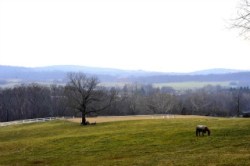Richmond, Virginia Febuary 8, Donna Holt, Virginia Campaign for Liberty
 Matt Lohr, Commissioner, Virginia Dept. of Agriculture and Consumer Services, touts conservation easements as a means of “protecting the family farm” in his recent Cooperative Living editorial.
Matt Lohr, Commissioner, Virginia Dept. of Agriculture and Consumer Services, touts conservation easements as a means of “protecting the family farm” in his recent Cooperative Living editorial.
The original intent of conservation easement was to provide the means for the struggling farmer to save the family farm and preserve agricultural and forestry industries.
It wasn’t long before wealthy estate owners took advantage of the generous conservation program with a state giveaway of vast sums – some measuring into millions of dollars – to induce millionaires to “conserve” luxurious estates that they had no intention of developing anyway?
Virginia, which forces the humblest homeowners to place their real estate transactions in public view, created a special law allowing the millionaires to shroud such deals currently measured at $106.8 million a year in taxpayer money. Conservation in Virginia makes that possible.
Virginia boasts that its land preservation incentives are the “most generous” in the country. Indeed, the state budgets over $100 million a year to pay people not to develop their land.
While the amount that any individual landowner receives is kept secret from the public, a 2010 investigation by Hook, a Charlottesville weekly newspaper, revealed a veritable who’s who from the Charlottesville business, entertainment, government, and environmental worlds taking advantage.
Such entertainment magnates as Dave Matthews, John Grisham, and Coran Capshaw join business titans Hunter Craig, Wick McNeely, and Jim Murray. Local leaders Ann Mallek from the Albemarle Supervisors and waterworks chair Michael Gaffney use the program. So do big names from the environmental world such as Nature Conservancy board member Michael Bills, Southern Environmental Law Center director Rick Middleton, and avid eco-donor Tony Vanderwarker.
All these people have partnered with green groups to receive compensation for keeping some land unspoiled. What could possibly be wrong about that?
“It’s socialized capitalism for the rich,” says former Albemarle teacher Mark Crockett. “People who buy big estates don’t plan to develop them. Why turn and give them a tax credit?”
Its also an appraisal racket. Biscuit Run serves as a prime example of the corrupt use of the conservation easement program.
The value of land is in its use. When the ability to engage in commerce and profit from the use of land is restricted and often denied, the value of the land is reduced. In contrast, an estate owned by wealthy elites maintain a much higher value per acre. The appraised value of the land determines the initial payout and tax benefits of the easement. The result is the benefit to the wealthy estate owner far outweighs the benefit to the struggling farmer.
The farmer is most often forced to place his land into a conservation easement to save it in response to the very strict land use regulations and expensive permits for every conceivable use of land. The noose is further tightened by limiting commerce, by permit only, to only raw produce. Permits aren’t granted for the sale of byproducts produced from the things farmers grow. Unless, of course, you happen to be the wife of a member of the Board of Supervisors in your locality as is the case in Fauquier County.
Fauquier County has some of the strictest land use restrictions of any locality in Virginia. Consequently, they boast a total of approximately 96,600 acres are in conservation easements, or 23 percent of the total land in the county, according to The Piedmont Environmental Council.
As numerous land trusts, set up by non-profits, have grown in size and number, so have their association and influence with government. This is particularly the case with large, national organizations like Piedmont Environmental Council and The Nature Conservancy, that obtain enormous sums from federal funding.
Many land trusts have operated more like government agents. They often help to write the strict land use regulations adopted by local governments. They stand in waiting to acquire easements from struggling farmers, only to turn around and quietly sell them – sometimes for a profit – to state or federal governments.
It’s not surprising that Matt Lohr, the Virginia Commissioner of Agriculture, would consider joining the ranks of the rich to fleece the taxpayer while he supports restricting the sale of agricultural products by a struggling farmer.
Donna Holt
Campaign For Liberty‘s Mission is to promote and defend the great American principles of individual liberty, constitutional government, sound money, free markets, and a noninterventionist foreign policy, by means of educational and political activity.










